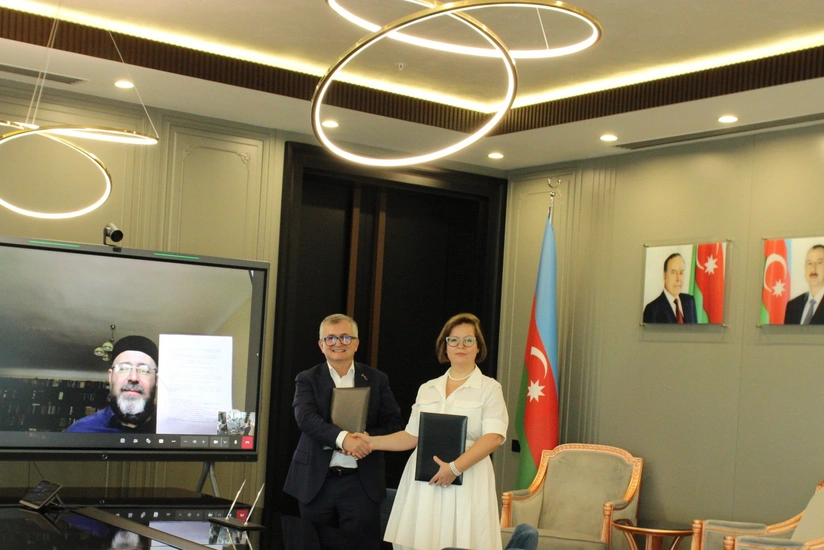Unique int'l project to study cultural heritage launched in Azerbaijan
- 06 September, 2025
- 14:26

A unique international project has been launched in Azerbaijan, dedicated to studying the origins of monotheism, folk spiritual traditions, and the sacred spaces of the country, Report informs.
The project brings together historians of religion, anthropologists, ethnographers, paleogeneticists, and specialists in Oriental manuscripts. Special focus is placed on Nakhchivan, Ateshgah, and folk narratives about Nuh (Noah) and Azar (Terah), the father of Abraham.
The initiators are Rifat Sultan-zade - Vice President of Azbrand Group of Companies; head of the Azerbaijani side of the project, Natalia Zhukova - Academic Director of the Nine Senses Art Center; art historian, art producer, specialist in cultural and educational initiatives, researcher of spiritual heritage, Gershom Kiprisci - Co-founder and CEO of the Leiden Institute for Rational Theology and Monotheism; theologian, religious writer, educator, organizer of academic and cultural projects.
He is also the author of dozens of theological, philosophical, and literary texts; has delivered lectures and conference papers at universities and academic institutes in Amsterdam, Oxford, Bedford, Chicago, Krakow, Tashkent, Bilecik, Kocaeli, Jerusalem, St. Petersburg, Moscow, Kyiv, and others. Fluent in many modern and ancient Eastern languages.
- Why is this project being carried out in Azerbaijan?
- Rifat Sultan-zade: "Azerbaijan is not only a modern state, but also a land where the concept of the One God was shaped at the crossroads of civilizations. We want to present the country as a living bridge between early Caucasian monotheism and the values of ethical monotheism in the 21st century."
- Which sites are key for this research?
- Gershom Kiprisci: "First and foremost, Nakhchivan, connected with Nuh (Noah), a symbol of survival and renewal. The second important site is Ateshgah, the Fire Temple, symbolizing light and spiritual memory. These spaces show how myths, rituals, and history form the sense of the sacred."
- How does your organization participate in the project?
Natalia Zhukova: "We create spaces where art, spirituality, and research are brought together. The project makes it possible to study Azerbaijan"s rich spiritual heritage more deeply, unite various cultures and traditions, and popularize the results of the project through visual support and educational initiatives, engaging experts from the academic community."
- What makes Azerbaijan"s religious history unique?
- Gershom Kiprisci: "Azerbaijan is one of the rare countries where Shiites, Sunnis, Zoroastrians, Jews, Karaites, Christians, and even Hindus and Sikhs have coexisted peacefully for centuries. This demonstrates that religious diversity can be a source of cultural wealth rather than conflict."
- Why did the project attract experts from different disciplines?
- Gershom Kiprisci: "Only an interdisciplinary approach allows us to see the full picture. The project involves historians of religions, ethnographers, anthropologists, manuscript specialists, and paleogeneticists. Genetic studies, for example, show that a significant portion of Azerbaijanis belong to haplogroup J, linked to the lineage of biblical and Quranic prophets. This symbolizes spiritual continuity."
- What results of the project are expected first?
- Gershom Kiprisci: "This year, a scholarly article will be published on the role of Azerbaijan"s ancient beliefs in the formation of early Caucasian monotheism. Special attention will be given to Nuh and Azar, the father of Abraham, to demonstrate how the faith in the One God has been transmitted from antiquity to the present day."
- Will the results be accessible to the general public?
- Gershom Kiprisci: "Yes, the project is open. The article will be published in open access so that everyone can explore the spiritual heritage and history of these sites."
- What is the significance of this project for modern Azerbaijan?
- Rifat Sultan-zade: "This is not just a scientific initiative. It is an opportunity to understand and rediscover our roots. Azerbaijan of the 21st century is building a modern, enlightened state based on morality, tolerance, and respect for different cultures. All these values go back to the ancient tradition of ethical monotheism. Spiritual heritage is not a museum artifact - it is the foundation of the future."
